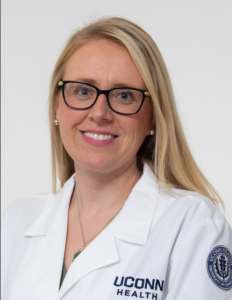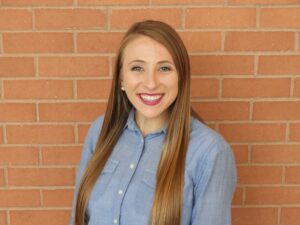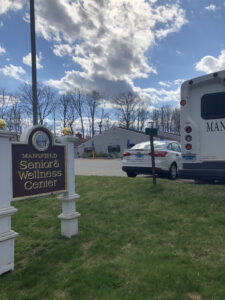By George Velky
Newswriting II
April 2024
MANSFIELD – Recognizing that loneliness and isolation among older adults increase the risks of mental and physical health problems, the town is working to provide those at risk with opportunities for meaningful social connections.
“Loneliness is toxic to the body,” said Dr. Kristina Zdanys, associate professor of psychiatry and head of the geriatric psychiatry and the behavioral health division at UConn Heath.
Older adults who experience loneliness are at a higher risk of dying from all causes. “There is a similar risk of death to smoking… 15 cigarettes a day,” Zdanys said.
Roughly 24% of Americans ages 65 and older are considered to be socially isolated and over 40% of adults ages 60 and older report feeling lonely, according to a study by the National Academies of Sciences, Engineering, and Medicine.
The study found that there was a roughly 50% increased risk of developing dementia as a result of social isolation, as well as a 25% increased risk for cancer.
Risk of coronary heart disease increased 29% and the risk of stroke increased by 32% due to older people having poor social relationships, the study said.
[infogram id=“increased-risks-caused-by-loneliness-and-isolation-1h984wvony1jd2p?live”]
Data from the National Academies. / graphic by George Velky
Social isolation is different from loneliness. Isolation is the objective state of being along. Loneliness is the subjective feeling of being isolated, according to the study.
Social isolation can come in many forms. Someone might be living in a community alone, living alone in assisted living or in a skilled nursing facility where their family isn’t visiting them, according to Zdanys.

Members of the older population face higher levels of social isolation and loneliness because of circumstances such as loss of friends and family and living alone, the National Academies found. Another issue is isolation due to lack of transportation.
“Loss is going to have huge impacts on their well being,” said Amanda Cooper, a professor at UConn with doctorate in communication and expertise in communication and aging.
Loss of a partner takes a significant toll on mental health because a relational partner is usually the core social support provider, Cooper said.
Contrary to what one might think, though older adults were not as severely affected by the COVID-19 pandemic as other age demographics. Zdanys attributed the older population’s ability to handle the pandemic to their ability to fight through difficult times.
“I think older adults have the benefits of resilience,” said Zdanys. “Sometimes people see resilience as an inherent trait, but resilience is actually something that can be cultivated and acquired through the process of growing older and being forced to overcome challenges.”
Cooper agreed that members of this population can deal with issues.
“Older adults have to be phenomenally resilient, they’ve made it that far, right,” said Cooper. She discussed research around how people build resilience for the future and how they use difficult situations in their past and apply them to difficult situations in their future.

Because most of the older population has regular interaction with the health care system, the National Academies said that the system must increase its role in recognizing when people are suffering from a lack of social connections, and provide them with the resources to reduce isolation and loneliness.
UConn Health has created a few initiatives to provide resources and increase its care.
One program is a support group for older adults that are caregivers for someone with dementia. Caregiving for spouses, friends or close relatives is a 24/7 responsibility and it absorbs a caregiver’s entire life. “That is going to largely impact their ability to go out and be social, when they could if they didn’t have that caregiving responsibility,” Zdanys said.
This program meets once a month, according to Zdanys. It gives caregivers an opportunity to interact and problem solve with others in similar situations.
Another program that UConn Health is starting is one where medical students will move into a facility for a week and experience what life is like there. Medical students are able to provide some extra social stimulation to the people who live there during their stay, according to Zdanys. The students are also able to develop empathy for older adults, and gain insight into the impacts of social isolation and loneliness. With this knowledge, these students will be more keen on these issues and how to help at-risk older adults throughout their careers.
There is also a correlation between social interaction and mental health.
Social isolation and loneliness can lead to anxiety and depression, according to the National Institute on Aging. The National Academies also found that social isolation leads to higher suicidal intention.
“The highest rate of suicide is among older when men, over the age of 75,” said Zdanys. When you combine that statistic with the aspects of isolation and loneliness, that demographic is at risk at a concerning level.
However, having social connections at a quality level can “improve positive mental health, life satisfaction and quality of life,” according to the World Health Organization..
“People who don’t have baseline cognitive problems, who are socially engaged, may be less likely to develop dementias like Alzheimer’s disease,” said Zdanys. “Cognitively, it’s crucial that people have social engagement.”
Having strong social connections is more important than having many social connections for older adults, according to Cooper. She said, “When it comes to loneliness in older adulthood, it’s the quality of your connections that matter the most.”
The town of Mansfield has taken many steps to provide older adults in the community with opportunities for social engagements.
Dozens of classes, outings, and services are provided by the Mansfield Senior Center to help increase social connections among the older population. The center provides entertainment services including creative arts groups, lifelong learning groups, game nights, movie nights, TED talks, fitness classes, regional outings and more.
Human services and well being resources such as haircuts, a hearing clinic, emergency financial assistance, emergency food assistance and more are offered.
Transportation opportunities are also provided. The center offers shopping and errand rides every Tuesday, as well as ride requests to book transportation for medical appointments, according to the Mansfield Senior Sparks Newsletter.

The most popular activities are “definitely anything revolving around food,” said Jessica Tracy, senior center supervisor of the Mansfield Senior Center. She said that bingo was also very popular and on days that haircuts are offered, the center is crowded throughout the day.
Tracy reported solid participation by older adults at the senior center. They usually get around “75 people just for lunch alone,” she said. But “probably well over 100 on some of those days.”
Tracy has been working with the town for over 16 years, but just started at the senior center in February 2024.
She has goals toward how she can improve the center. “Evaluating the programs and seeing how we can make them better or more effective and efficient is a priority,” said Tracy. “Is there a better day? Is there a better time? Would there be a better instructor or better format?”
Most of the marketing for the senior center is on the Mansfield town website, according to Tracy. The center uses Facebook for social media information but she attributed a lack of posts right now to staffing issues.
A monthly newsletter is provided by the senior center called the Mansfield Senior Sparks Newsletter. This document highlights every program and activity offered by the center throughout the month. There is a calendar provided as well, which provides the dates of the services.
Other work being done to provide opportunity for older adults to avoid isolation in collaboration with the housing areas in Mansfield to increase awareness of programs and services. Tracy said the center works with Juniper Hill Village, Rolling Hills, and Glen Ridge ownership to make sure the communities have the senior center newsletters.
It is relatively inexpensive for members to get social engagements and avoid isolation and loneliness.
Tracy said that the center receives a subsidy from the town that helps offset costs for some of the programs. Lunch is about $5 a day and some other programs are slightly more expensive, according to Tracy. “Lunch three times a week and maybe two other programs, that’s maybe $30,” Tracy said.

Tracy is also a member of the Mansfield Commission on Aging. This group, alongside the town of Mansfield and its planning and zoning commission, have been performing a facilities study.
The study is looking at 13 buildings within the town to see where the biggest needs are in the future, according to Tracy. “This building here, it definitely has some challenges. It is an older building and we do at times reach capacity,” Tracy said in reference to the senior center.
She explained that when the center is at capacity, parking is inadequate. She said the location is optimal and that the commission is “looking at what they want to see in either a new or renovated facility.”
Tracy said that the budget for the upcoming year is getting to a point where hopefully there is money for designing a plan and moving forward. When asked about a timeline, Tracy said, “I don’t really have an answer for that. That’s part of the challenge, that really nobody does.”